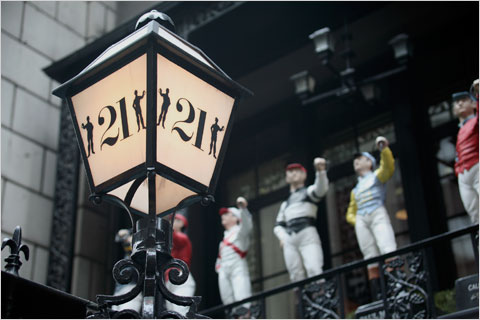How to Review Landmark Restaurants, and How Not To
The events of this week provided an interesting object lesson on the tricky matter of how to review a landmark restaurant. Many reviewers feel that the same rules should be applied to all restaurants, whether 1 or 100 years old. If the food and service is bad or good, say so. No punches pulled. I find this perspective short-sighted. Historical eateries are not just places where people go to feed their face and have a nice time. They are part of the fabric and heritage of the city we dwell in. Their serve purposes well beyond culinary sustenance, just as City Hall is more than a building where politicians can get their work done, and classic skyscrapers more than a stacking of offices.
The other day, Pete Wells, the restaurant critic of the New York Times, reviewed the "21" Club. Everyone knows that the food at "21" is not cutting edge, nor is it meant to be. That is a failing, perhaps, but haute cuisine is not the point of this classic, speakeasy-era restaurant, and it's not the main reason anyone goes. Wells got that, and his review, which could have been a hatchet job in the hands of another critic, was a study in journalistic balance and grace. It was more an appreciation, than a review. Here are a few choice bits:
READERS who look forward to the dark thrill of a public execution on days when there are no stars attached to this column should turn elsewhere to satisfy their blood lust. This is going to be a kind of love letter to a restaurant where the food is largely forgettable and the prices are almost always unwarranted...
But to judge “21” as a restaurant is to miss the point of the place. Like Galatoire’s in New Orleans, “21” is at its best when you treat the food as a solid foundation for the liquid entertainment...
I regret all the songs I could have belted out around the piano at Bill’s Gay Nineties. I regret the nights I didn’t tune in to hear the huge mahogany doors on Danny Stiles’s Art Deco penthouse swing shut as Mr. Stiles bid all his radio listeners “Good night, dear hearts.” I regret the rides I didn’t take on Checker cabs while they still prowled the avenues.
I don’t want to add “21” to the list.That's not just a classy review. That a critique that, given the subject, approaches the task from exactly the right perspective.
Meanwhile, up in Boston, the timeless chop house Locke-Ober, home based for Beantown power brokers, suddenly closed its doors after 137 years. WBUR interviewed Corby Kummer, the restaurant critic for Boston magazine, about the restaurant’s place in the city’s history. Kummer, who panned the place in a review in 2011, praised the business for its ornate bar and shiny silver and sense of history. But he also had to get his licks in and show, as a journalist, he showed no mercy when he wasn't happy:
Aside from the food, which was absolutely full of butter and cholesterol, it was ridiculously overpriced. It was very expensive for what it was. But what bothered me most when I re-reviewed it last year — and I wanted to like it, because I love historical places — was the lack of diversity I noted. It just seemed really conspicuous among the waitstaff and the clientele, and I thought: They aren’t keeping up with the times and they need to attract more people.So, in Kummer ego-centric, dim-witted view, since Locke-Ober didn't serve food he liked or cater to clientele he politically approved of, it had to go. 137 years of Boston cultural history be damned. Then he had the gall to add this:
I don’t know that I felt that it was time for it to go because that magnificent bar downstairs should never go, and everyone who comes to Boston should have a chance to go in there.If you felt that way, Corby, then say it in your review, not over the restaurant's coffin.








2 comments:
Well said, well said, by Mr. Wells, and by you, Brooks. May damnation fall on the heads of the Kummers of the world who completely fail in the art of criticism because they do not know the difference between "critical" and "criticise." For Kummer, Locke-Ober did not meet his PERSONAL approval, and so it was savaged for the GENERAL audience. True critics know excellent cuisine (and that which is merely "good", "fair", or "poor" as well) on the basis of the criteria derived from norms held by the "community" of that cuisine. Therefore, a true critic should be able to accurately review a restaurant that serves a cuisine the critic personally abhors, because the critic has the experience to know the standards by which to judge the food. What we see too much of today are "critics" who know very little about food and cooking but who know (as we all do) what they like. These "critics" write "reviews" that are no more than a recitation of their subjectivity without objective content or even much content to guide or educate the reader.
Here's a tip o' the hat to Pete Wells, who knows that there's more to a great dining experience than enjoying the magic act of molecular gastronomy. Judged by cuisine alone, 21 cannot stand up to the likes of Per Se, but if I were to use the strengths of 21...the history and cultural association with the city, the ambiance of the architecture and appointments, the "feel" ...then I would find Per Se by far the weaker sister. Mr. Wells seems to understand this.
Somehow I doubt that people pay much attention to newspaper restaurant reviewers anymore. Yelp is much more influential, for the record it gave 21 Club three and a half stars.
Post a Comment